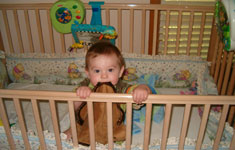 Even under the most normal circumstances, finding childcare that you are comfortable with can be difficult. But, as the parent of a child with hemiplegia, your search may be even more difficult. Fortunately, there are several options available, including sitters, nannies, licensed childcare centers, and childcare centers that specialize in working with special needs children.
Even under the most normal circumstances, finding childcare that you are comfortable with can be difficult. But, as the parent of a child with hemiplegia, your search may be even more difficult. Fortunately, there are several options available, including sitters, nannies, licensed childcare centers, and childcare centers that specialize in working with special needs children.
Regardless of what you choose, there are some important issues to consider:
The center itself. Unless you have a sitter or nanny come to your house, make sure the location you are bringing your child to accommodates your child’s needs. Do they have a ramp or a limited number of stairs? Will they eliminate trip hazards or provide your child with developmental toys? Will they use a stroller to transport your toddler to the playground?
The teacher. Don’t be afraid to ask your child’s teacher to provide your child with specialized attentions. He or she should be able to encourage your child to use his or her affected hand or leg and will probably be willing to use creative ways to help your child learn.
Therapy or other services. Your child care provider needs to understand that physical, occupational, and speech therapy are part of your child’s routine. Accommodations will have to be made for your child to attend therapy sessions and exercises should be incorporated into your child’s routine.
 Your child’s needs. Your child care provider should be interested in learning more about your child and his or her needs. Are they willing to work with you and your child’s therapists to make sure your child is thriving? Are they willing to help your child with activities that may be difficult for him or her, like going to the restroom?
Your child’s needs. Your child care provider should be interested in learning more about your child and his or her needs. Are they willing to work with you and your child’s therapists to make sure your child is thriving? Are they willing to help your child with activities that may be difficult for him or her, like going to the restroom?
Make sure your child is progressing in classes with children close to his or her age and that your care provider is not holding your child back based on slower motor skill development.
Open communication. Nothing is more important than working with a child care provider who is willing and able to communicate with you on a regular basis. You need to know that your child is being well taken care of and is progressing. You also need to feel comfortable communicating concerns about your child’s care. In addition, you will want to know if your child is developing behavioral problems or demonstrating problems learning, so you can address those things at home.









